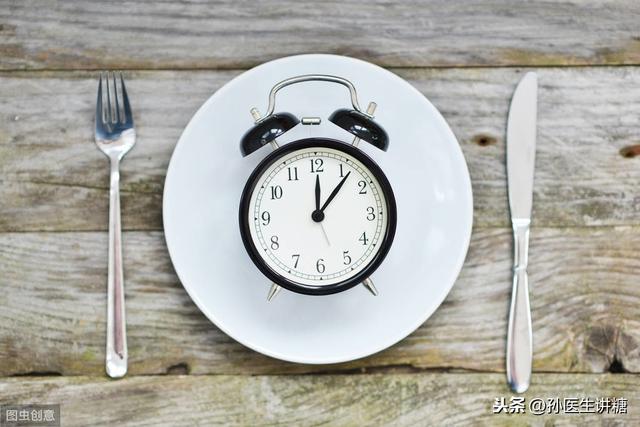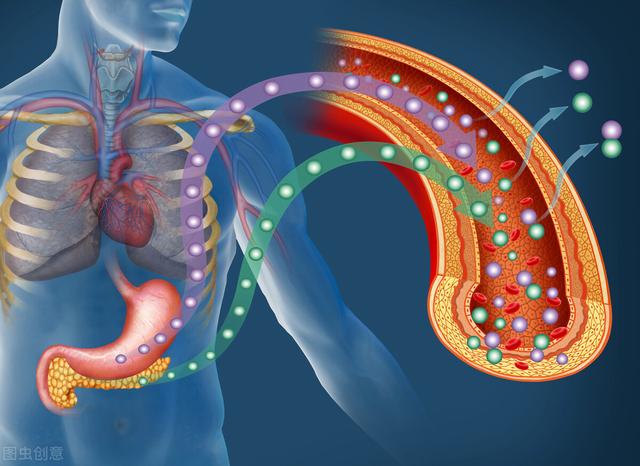Can you eat two meals a day with diabetes? Why?
This question must be answered.
Do diabetic patients have smoother blood sugars when they eat two or three meals a day, or when they eat fewer meals and become five to six? Observational studies have found that people who eat two meals a day will have better blood sugar than those who eat three meals a day as well as fewer meals.
We used to think that if we ate smaller meals, each meal would have a minimal effect on our blood sugar, and therefore our blood sugar would be stable, but in reality, eating smaller meals constantly stimulates the pancreas to secrete insulin, which is a much stronger stimulus to the pancreas and aggravates its burden. It's the equivalent of making the pancreas work at 996. The insulin produced by the pancreas is the only hormone in our body that can lower blood sugar, so when some strikes or even collapses, of course our blood sugar gets worse.
In fact, as a diabetic patient, it's especially easy to get an answer to this question. You can try eating three meals a day one week, two meals a day the next week, and measure your blood sugar at seven points in time during the last one or two days of each week, and you'll have the answer when you compare them.
Of course the overall calories eaten should be close to the same when eating two meals a day compared to three meals a day.
It takes a while for your diet to adjust to your body. So, finding a diet that works for you and eating regularly will protect all the body's functions.
The picture is of my breakfast one morning, which was relatively large, in fact two slices of waffle, a small taro, and an egg that I didn't eat, and I ate the rest. That was basically two meals for the day. A similar diet went on for about two days, and my weight plateaued.
In other words, I think another benefit of centralized eating is that you can eat a little bit of variety of foods into a composite, after which the rise in blood sugar slows down.
I'm Xu Xu speaking about sugar. I hope my answer is useful to you.



I'm answering this question as a longtime high blood sugar and diabetes health dietitian.
It is not advisable to eat two meals a day for diabetes. Why? What is reasonable advice?
The main reason for poor glycemic control in diabetic population is the relative or absolute insufficiency of secretion of hormones that regulate blood glucose balance, especially hypoglycemic hormones, and the decrease of insulin sensitivity. For such a situation, the most important thing to avoid is to control the blood glucose to appear suddenly high and low roller coaster changes, how to do so, blood glucose largely from the daily diet, food digestion and decomposition, and ultimately in the form of glucose absorbed into the bloodstream, in addition, diabetic people, regardless of whether satiety or hunger, the body is always in the "starvation state! In addition, whether people with diabetes are full or hungry, their bodies are always in a state of "starvation" - the body always mobilizes the breakdown of fat, and then enter the gluconeogenesis pathway, leading to the body's real body to synthesize glucose (i.e. blood sugar). Even if the body is in a long period of time in a stable range of high blood sugar or "roller coaster" of blood sugar rapid rise and fall on the body's impact, of course, control of blood glucose tends to be close to the normal range is the most desirable state, so in order to ensure that the body's blood glucose in a relatively stable fluctuations in the range of the diabetic patient is best to do to eat less and more often, 5-6 meals a day, i.e. breakfast, lunch, dinner, lunch, dinner, dinner, dinner, dinner, dinner, breakfast, lunch and dinner. That is, breakfast, Chinese food, dinner, morning and afternoon meals, evening meals. Each meal should be seven to eight minutes full. It is not advisable to eat too much.
I hope the above answer will help you with your query.
A diabetes specialist answers the question.
Is it okay for diabetics to eat two meals a day? This is a situation we often see in the clinic. In this case.There are old people, who have formed the habit of living for many years; there are young people, who have developed the habit of not eating breakfast; there are middle-aged people, who don't eat for dinner in order to lose weight. In all shapes and sizes, there are young people who disregard their health for work/play, and middle-aged people who do it to maintain their health!
It's all about one less meal, what's the difference? Is it a good habit to have two meals a day? How does it affect blood sugar?
In diabetic patients, due to absolute or relative insufficiency of insulin secretion, postprandial blood glucose will be significantly elevated after eating because there is no corresponding insulin to counteract the elevated blood glucose.
For the characteristics of this disease, we always recommend that patients should eat fewer and more frequent meals, with little increase in blood glucose after meals and less burden on the pancreatic islets, in order to maintain a relatively stable blood glucose.
But to the question above, the long-term habit of eating two meals a day is different for diabetics than skipping breakfast or dinner.
Long-term habit of eating two meals a day, mostly the elderly, their pace of life slows down, their metabolism is also slowing down, the need for calories is significantly reduced to my contact with the elderly habits are mostly in the morning around 9:00 am to eat the first meal, the second meal in the afternoon around 5:00 pm, and no longer eat the main meal the rest of the time. This kind of living habit is actually quite good and very regular.
And for diabetics, it's great to get into the habit of eating regular meals at regular intervals, and to be able to coincide with the action of oral hypoglycemic medications, which also keep blood sugar in a very stable range.

For young or middle-aged people to reduce the number of meals, and the reduction is the main meal, this is very detrimental to their health.
The bad side of not eating breakfast is very clear to everyone, it will make people slow reaction, dizziness, panic, may appear stomach disease, heart disease, diabetes and other kinds of chronic diseases, a morning of not eating, will be in the lunch a lot of food, eat more, may lead to obesity, etc., and constipation, gastrointestinal diseases, etc., may be.
More importantly, because of the absence of meals in the morning, the long interval between dinner and lunch the next day, and the use of hypoglycemic drugs that do not achieve a sufficiently long duration of action, it leads to an increase in blood glucose and the possibility of diabetic ketoacidosis due to the lack of energy intake and the consumption of proteins and fats.
The same problem exists with skipping dinner; due to hunger, sleep disorders may also occur, leading to further elevation of blood sugar.
To summarize:For diabetics who have long been on a two-meal-a-day diet, they can maintain their current eating habits and talk to their supervising physician about choosing glucose-lowering medications that have a sufficient duration of action to effectively lower their sugar.
For young and middle-aged people with bad eating habits, it is still recommended to eat three meals a day in order to maintain vigorous energy for work and study, and the medication can work according to a certain time.
Diabetics should also be on time every day three meals, staple foods, including potatoes, sweet potatoes should be eaten sparingly to control the amount of more roots, stems, leaves, flowers type of vegetables, the old saying, control your mouth, open your legs! Healthy body evening with you!
On my first day of employment, I had the following conversation with my coworker:
A coworker greeted me warmly, "Where are you from?"
I slowly replied, "From Heaven's Gate."
A coworker suddenly and pleasantly asked, "Do you only eat two meals a day there?"
I was confused, "No, we eat three at our house."
A coworker explains the reason: "I used to have a coworker who went home with her boyfriend, who was from Tianmen, and the family only ate two meals and starved her to death."
Indeed, in our hometown, there are quite a number of elderly people who have long developed the habit of eating only two meals because it is troublesome to cook and because it is adapted to their farm work. There are also some young people who will skip dinner in order to lose weight.

If you areDiabetics, can you eat only two meals a day?It depends on whether you eat regularly on a regular basis.
For example, manyold personIt's always been once in the morning, once in the afternoon, early to bed, early to rise, eat less, metabolize slower, and don't get hungry, and that's fine.
If you're saying that you'reYounger sugar addicts or those with heavier physical workloads.Need more energy, that is still 3-5 meals a day, less food more appropriate, so that the postprandial blood glucose will not rise quickly, the burden on the pancreatic islets is not heavy.
In short, for sugar lovers, it is very important to develop regular meals, otherwise with the effect of glucose-lowering drugs time is not coordinated, easy to trigger hypoglycemia, hunger after overeating will cause significant fluctuations in blood sugar.
Finally, good health!
If you have any questions about health management or diabetes, please feel free to write to us or share your questions in the comments section.
--END--
Editor-in-chief|Jin Xiaoxiao
(Answer: Dr. Jia, Institute of Infectious Diseases, Tianjin Medical University)
Our blood glucose is in a state of dynamic change throughout the day, with a variety of factors affecting it, among which diet is the easiest way for diabetics to manage their blood glucose on their own. For many years we have recommended that people with diabetes eat smaller and more frequent meals, but in recent years diets such as "no lunch" and "8-hour eating" have become widely popular, so how do you eat in a way that is more conducive to controlling your blood glucose?
Regarding the number of meals, some studies have found that, with the same total energy, eating 2 meals a day versus 6 meals a day, the former can reduce the stimulation and burden on pancreatic islets, increase insulin sensitivity, and help to reduce body weight and visceral fat. However, such studies are inconclusive, and some patients have experienced adverse reactions such as severe hunger, dizziness, and stomach pain when trying to eat 2 meals a day; while some patients who ate fewer and more frequent meals reported that their blood glucose increased instead, and they also gained weight. Therefore, dietary management is not an easy task and needs to be repeatedly worked out and formulated according to one's own situation.

The key to adjusting the number of meals is to find your own "balance point". For example, elderly people with low activity level, people who can ensure that two meals are rich in variety without affecting the intake of nutrients, people who are obese and need to control their weight, and people who don't feel serious hunger, can try to eat two meals a day, but they should be extra vigilant against the occurrence of hypoglycemia! Especially for patients treated with insulin or insulin-promoting drugs, hypoglycemia caused by missing meals is very dangerous. As well as patients who want to increase the amount of exercise to reduce sugar, feel hungry need to make certain additional meals, such as milk, eggs, vegetable salad, in order to prevent hunger affect normal life. Two meals a day to avoid a meal with too little another meal overeating, to try to the day's energy intake evenly distributed. Part of the people who are obviously thin after suffering from diabetes, as well as those who have digestive system diseases themselves, it is not recommended to have two meals a day to prevent further aggravation of malnutrition.
For patients who eat more frequent meals, the focus should not be on "more meals" but on "less food". While eating smaller meals, it is important to ensure that meals are smaller and that energy intake throughout the day does not add up to more than the patient's total calorie needs. The principle of eating less and more often is that the total number of calories remains unchanged, a small number of additional meals between meals, such as vegetables, eggs and milk, low-sugar fruits, in order to assist in reducing the intake of carbohydrates in the main meal. Additional meals try to avoid secondary processing snacks, high-calorie high-fat nuts, high-sugar fruits, and the number of additional meals should not be too many, the time interval should not be too short. Cooking methods should be as light as possible to prevent excessive total calorie intake for the day.
Whether you are a diabetic or a healthy person, the adjustment of the number of times you eat should be based on your own situation and dietary habits, and it is best to work it out with the help of your doctor or dietitian. After finding the right meal time, frequency and amount for yourself, you should try to keep it fixed and observe your blood glucose level and digestive system's reaction at any time, in order to help you better manage your blood glucose and your health status.
Regardless of the type of diabetes mellitus, diet and nutritional therapy is one of the most important components of diabetes treatment, is the basis of all treatments, and is indispensable for prevention and control at any stage throughout the natural course of diabetes mellitus.
Therefore, diabetic patients have to mentally raise the diet to the height of treatment. You can't dine too casually and eat blindly, which will lead to the failure of sugar control.
Eating only two meals a day is not recommended for diabetics, as it is not good for blood sugar control. This is because the first step is to calculate the amount of energy needed for the day based on a combination of our height, weight, and activity level. Reasonable energy intake can ensure our nutritional needs and prevent complications.
However, if the energy needed in a day is evenly distributed to 2 meals, it will result in too much intake in each meal, and the postprandial blood glucose rises higher, which is not conducive to blood glucose control. Therefore, we suggest that diabetic patients should preferably eat fewer and more frequent meals, which is more conducive to the stabilization of postprandial blood glucose.
If you are unable to have a normal meal at noon due to work issues, running sales outside or other reasons, I suggest that you add a proper meal in between your two meals, which prevents hypoglycemia from occurring and is good for the stability of your blood sugar as well as your nutritional needs. I would like to give you a suggestion for additional meal, you can refer to it: Mixed grain cookies + cucumber + dried tofu/nuts.
If you are staying up late and waking up late, resulting in eating just two meals a day, I would highly discourage it. I hope you will try to adjust your work schedule and eat breakfast on time. Because staying up late can cause the following harm:
(1) Norepinephrine secretion can be excessive, and this condition can lead to an increase in vasoconstriction;
(2) The sympathetic nerves in the hypothalamus are in a state of excitation, which increases catecholamine secretion and inhibits insulin secretion, which is not conducive to the metabolism of blood glucose, thus triggering high blood glucose.
If often insomnia or stay up late, it will also trigger a person's neurasthenia, easy to trigger nervousness, or even depression, that is worse than diabetes.
In the end, it is still hoped that the sugar addicts will develop: a healthy lifestyle of eating small meals, going to bed early and waking up early. Some habits are hard to change at the time. However, the tens of thousands of sugar addicts that I have treated have found that once they take the first step, it is not as difficult as they thought!
Metabolism, is related to time. Or rather, with the 24-hour cycle of the day. There is a pattern to what the body does at different points in time. This is called a biological rhythm, or a physiological rhythm. It's like a big 24-hour wall clock that runs week after week. Since metabolism has a physiological rhythm, the diet has to conform to that rhythm. A break in the rhythm is not a reform, but may be a search for a disease, or even your own life.
Previously, I talked about fasting therapy to improve chronic diseases, which talked about a fasting method called TRF, that is, Time-Restrict Feeding (Time-Restrict Feeding), that is, in the day designated time can only eat, the other time is not allowed to eat, and can not drink beverages containing calories, and, in this day, can not eat more than 12 hours, preferably in the 8 hours. The best time to eat is within 8 hours. If you can eat for 8 hours, the duration of fasting is 24 - 8 = 16 hours. Therefore, the duration of fasting in a day should be more than 12 hours, preferably 16 or even 18 hours. (Of course, this varies from person to person.)
Eat less and eat more. Once practiced by front-line endocrinologists or diabetologists. However, biomedical research has found that it may not be the case at all.
On June 7, 2019, the American Diabetes Association (ADA) Annual Meeting kicked off in San Francisco, CA. Courtney Peterson, an expert from the University of Alabama, presented: Intermittent Fasting and the Circadian Clock. This presentation attracted a lot of attendees: the impact of chronobiology in weight, metabolism and blood sugar. In fact, it was: what is the right time of day to eat.
The conclusion: it's best to eat dinner before 3pm.
Why is it said that all the food that should be eaten in a day should be eaten before 3:00 p.m.? The conclusion of this report also matches the ancient Chinese health rhythm: 辰时(7:00-9:00): the stomach meridian is in command, the best time to eat breakfast; 未时(13:00-15:00): this hour of the small intestinal meridian is in command, is the best time for the absorption of nutrients in the small intestine.
Finish your meals for the day by 3 p.m. Two meals a day is plenty.
However, not eating after 3:00 may not be possible for many people. What to do?
Eat a large breakfast and a smaller and earlier dinner. The food ratios for breakfast, lunch and dinner are: 50%: 40%: 10%.
Breakfast eat half of the day's calories, dinner only eat 10% of the day's calories. I personally experience three days, the weight actually dropped 2 pounds, recommended that everyone try.
However, even then, it is best to have dinner no later than 18:00 hrs.

Often diabetics ask the question: diabetes is caused by insulin breaking down the blood sugar produced by poorly eaten food, so is it possible to reduce blood sugar by eating less, such as eating only two meals a day?
The answer may disappoint these diabetics; not only can diabetics not eat only two meals a day, but they can't afford to miss one of their three meals a day.

Why diabetics shouldn't eat only 2 meals a day
First of all, the human body after eating insulin secretion law is this, after eating to start secretion, healthy human body secretion is generally proportional to the amount of food patients, because the secretion of insufficient will lead to increased blood glucose, stimulate the pancreatic islets secretion of insulin. However, over time, the pancreatic islets become overburdened, and there is insufficient or relative insufficiency of pancreatic secretion, thus manifesting diabetes mellitus.
If diabetes in this case, diabetes eat one less meal a day, but only two meals will certainly binge eating, eating too much food, which will stimulate the pancreatic β secretion of more insulin, causing abnormal fluctuations in blood glucose, and poor pancreatic function of the patient may therefore intake of food is too much, the body can not utilize the food all at once resulting in an abnormal rise in blood glucose, which may lead to a ketosis and other critical events. It is very unfavorable to the health of patients.

Also, because diabetics do not utilize the glucose provided by food well, they get hungry easily and may be very hungry not long after eating. If they eat only two meals a day, there is a greater chance of severe hypoglycemia, which can be life-threatening.
In summary, it is not feasible for diabetics to lower their blood sugar by eating one less meal per day.
This is how diabetics should eat on a daily basis
1、Three meals a day at regular intervals. In order to ensure the rhythm of insulin secretion, three meals a day need to be regular and quantitative, do not overeat, not to mention dieting to lower blood sugar. Ingredients should be rich and varied, try to choose fresh green leafy vegetables and fruits, meat food to chicken, fish and shrimp meat and other white meat, and staple food should choose corn, buckwheat, oats and other coarse grains.
2. Eat less and more meals, and pay attention to additional meals in addition to the three meals. Diabetic patients will soon appear after the meal hunger, it is recommended that the three meals a day can be added at the right time, such as in the morning and between lunch eat some tomatoes, cucumbers and other fruits, between lunch and dinner eat some coarse grains cookies, etc., must pay attention to a small number of times.

3, the order of eating has to be careful. In order to ensure that the peak blood glucose after eating in a short period of time, it is recommended to eat fresh vegetables, which dietary fiber can also increase the body's sense of satiety, and then eat chicken, fish, shrimp and meat rich in unsaturated fatty acids meat, and then coarse grains and beans made of staple foods.
4, do not eat too late at night. Dinner try to arrange in 6, 7 o'clock or so, if dinner is eaten too late, eat soon into sleep all day, the body of food in the glucose consumption is slow, easy to lead to the next morning's fasting blood sugar is high.
I am Pharmacist Wang, insisting on spreading knowledge of diseases in simple and easy-to-understand words, and dedicating my own small contribution to a healthy China. If you think my answer is helpful to you, please leave a like! In addition, if you still have related questions, welcome to leave a message, we discuss together!
For diabetics, what and how much they eat each day is more important than whether they eat two or three meals a day, provided, of course, that they don't feel very hungry even after eating two meals. People with high blood sugar are prone to unstable blood sugar and are more likely to trigger hypoglycemia, the latter being more dangerous than the former.
Overweight or high body fat percentage, weight loss
Especially for those with abdominal obesity, a large waistline suggests excess visceral fat, and when the liver and pancreas are wrapped in fat, blood sugar can easily get out of control. When the waist circumference exceeds the healthy standard (adult female 80 cm, male 85 cm) need to lose fat

The Mediterranean Diet, recognized worldwide as a healthy eating pattern
A diet based on plant foods (cereals, lots of fresh fruits and vegetables, etc.), adequate high quality proteins (deep-sea fatty fish, seafood, eggs and milk, etc.), beneficial fats (olive oil, nuts, etc.), and very few desserts. Promote eating natural or minimally processed foods that share common characteristics of being low in calories, high in nutrients, high in fiber, low in sugar, and causing a lower glycemic response.
Staple foods are lowered appropriately, around 40-50%; fats 20-30% and proteins around 10-15%; one of the bigger changes is the source of beneficial fats, mainly olive oil, nuts, fish and other foods.

Fat and sugar, who's the blood sugar booster
Fat just provides more calories, and fat alone does not have an effect on blood sugar, but consuming too much can increase obesity. Sugar not only makes you fat, it also causes a greater blood sugar response, and the more you eat, the more pronounced the effect. Therefore, with a reasonable energy intake, reducing rapidly digestible sugars is the top priority for blood sugar control.
As for how many meals? Everyone has different habits. It's great to be used to eating fewer meals, each of which has little effect on your blood sugar and helps to keep it steady; used to eating two meals a day? That's fine too, but it's appropriate to add meals between meals to prevent hypoglycemia caused by multiple starvation, and starvation by the next meal. Both of these situations are prone to destabilize blood sugar, and are more taboo situations for diabetics.
Text/Wang Qiuxia
Images are from the internet and have been deleted.
This question and answer are from the site users, does not represent the position of the site, such as infringement, please contact the administrator to delete.